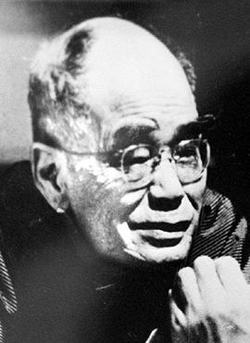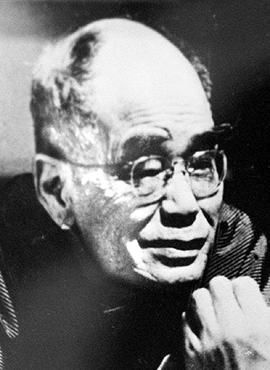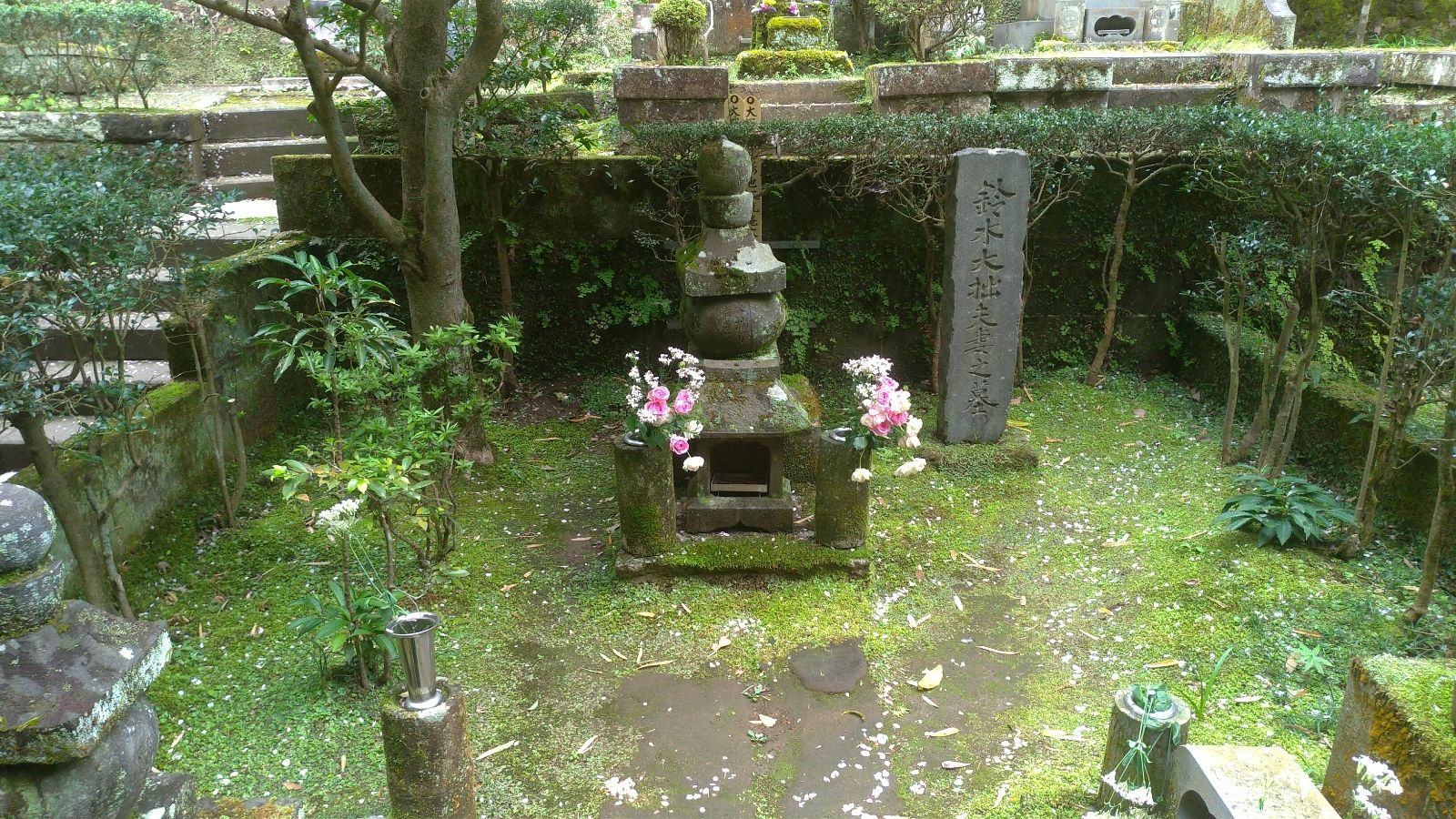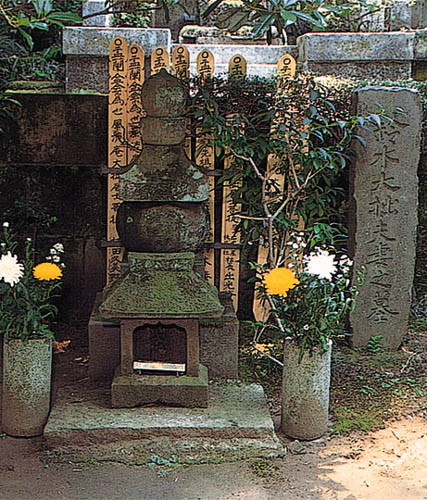Religious Figure, Author. He gained recognition as a Zen Buddhist scholar, who was a Japanese essayist, philosopher, translator, a prolific author with over 100 books published in both Japanese and English, and considered the Buddhist "apostle to the West". Born the son of a physician, who died young leaving a widow to live in poverty, his birth name was "Teitaro Suzuki" and is also known as "Daisetzu Suzuki", yet used D. T. Suzuki in the United States. An older brother financed his education. He enjoyed a nearly 40-year and multi-faceted career during which began as first, an English teacher then novice Zen monk in Japan. After relocating to the United States, he subsequently joined the Open Court Publishing Company in, LaSalle, Illinois as a proofreader, editor, and translator. He thereafter joined the faculty of the Imperial University, Tokyo, as a professor of English, followed by service at Gakushuin University in Tokyo and Otani University in Kyoto. After several years in Japan, he became a visiting professor at Columbia University in New York from 1955 to 1957 and also lecturer at numerous institutions, including Cornell University, Yale University, Harvard University, and in England at Cambridge University and Oxford University. He participated in various conferences, including the 1936 World Congress of Faith, 1949 East-West Philosophers' Conference, and 1952 World Congress of Buddhists. He became the founder and director of Matsuga-oka Bunko, a library, in 1946, and later served as president of the Tibetan Tripitak Research Institute. At the peak of his career, Suzuki was probably the Western world's foremost authority on Zen Buddhism. His many writings influenced several leading thinkers, including writer Aldous Huxley, psychiatrist Carl Jung, and fellow Buddhists Christmas Humphreys and Alan Watts, thus establishing him as an unrivaled exponent and interpreter of the Zen method and perspective. In a 1957 profile for "New Yorker" magazine, Winthrop Sargeant asserted, "Dr. Suzuki is, in fact, merely the most celebrated and most eloquent international commentator on a branch of Buddhist thought that is followed, in a popular form, by millions of laymen in Japan..., and, in a more advanced form, is practiced with rigorous austerity by thousands of monks and acolytes in various secluded Japanese monasteries." During World War II, Suzuki drew the wrath of his countrymen for criticizing Japan's militaristic policies, and he even came under surveillance by Japanese police. After the war, Suzuki moved back to the United States, where he lived in New York City and gaining prominence as an authority on Zen. His "Essays in Zen Buddhism" were reprinted to great acclaim. As Suzuki's reputation grew in the West, so did the popularity of Zen. Its influence was evident in music, particularly jazz, and in literature, notably the fiction of J. D. Salinger. In the 1950s Suzuki enjoyed particular success with his volume "Mysticism: Christian and Buddhist," in which he traced similarities between the two religions and supplemented his findings with translations of Japanese mystics. J. M. Kitigawa, reviewing the book in "Christian Century," described it as "very rewarding" and cited Suzuki as "the most prominent authority on Zen Buddhism." Suzuki also reached readers through anthologies compiled from his previous works. His "Zen Buddhism," edited by William Barrett, was even accessible to the general public, for Barrett had organized the volume into chapters exploring specific aspects of Zen. Noteworthy in the book are sections such as "The Meaning of Zen Buddhism" and "The Historical Background of Zen Buddhism," both of which feature provocative accounts of early Zen masters illustrating the elusive simplicity of the actual subject. At age ninety-one, he completed his last book in English, "Kyogyo-shinsho", and died six years later at St. Luke's International Hospital. In 1911, Suzuki married an American, Beatrice Erskine Lane, a Theosophist and Radcliffe College graduate, who died during World War II. The couple had a son.
Religious Figure, Author. He gained recognition as a Zen Buddhist scholar, who was a Japanese essayist, philosopher, translator, a prolific author with over 100 books published in both Japanese and English, and considered the Buddhist "apostle to the West". Born the son of a physician, who died young leaving a widow to live in poverty, his birth name was "Teitaro Suzuki" and is also known as "Daisetzu Suzuki", yet used D. T. Suzuki in the United States. An older brother financed his education. He enjoyed a nearly 40-year and multi-faceted career during which began as first, an English teacher then novice Zen monk in Japan. After relocating to the United States, he subsequently joined the Open Court Publishing Company in, LaSalle, Illinois as a proofreader, editor, and translator. He thereafter joined the faculty of the Imperial University, Tokyo, as a professor of English, followed by service at Gakushuin University in Tokyo and Otani University in Kyoto. After several years in Japan, he became a visiting professor at Columbia University in New York from 1955 to 1957 and also lecturer at numerous institutions, including Cornell University, Yale University, Harvard University, and in England at Cambridge University and Oxford University. He participated in various conferences, including the 1936 World Congress of Faith, 1949 East-West Philosophers' Conference, and 1952 World Congress of Buddhists. He became the founder and director of Matsuga-oka Bunko, a library, in 1946, and later served as president of the Tibetan Tripitak Research Institute. At the peak of his career, Suzuki was probably the Western world's foremost authority on Zen Buddhism. His many writings influenced several leading thinkers, including writer Aldous Huxley, psychiatrist Carl Jung, and fellow Buddhists Christmas Humphreys and Alan Watts, thus establishing him as an unrivaled exponent and interpreter of the Zen method and perspective. In a 1957 profile for "New Yorker" magazine, Winthrop Sargeant asserted, "Dr. Suzuki is, in fact, merely the most celebrated and most eloquent international commentator on a branch of Buddhist thought that is followed, in a popular form, by millions of laymen in Japan..., and, in a more advanced form, is practiced with rigorous austerity by thousands of monks and acolytes in various secluded Japanese monasteries." During World War II, Suzuki drew the wrath of his countrymen for criticizing Japan's militaristic policies, and he even came under surveillance by Japanese police. After the war, Suzuki moved back to the United States, where he lived in New York City and gaining prominence as an authority on Zen. His "Essays in Zen Buddhism" were reprinted to great acclaim. As Suzuki's reputation grew in the West, so did the popularity of Zen. Its influence was evident in music, particularly jazz, and in literature, notably the fiction of J. D. Salinger. In the 1950s Suzuki enjoyed particular success with his volume "Mysticism: Christian and Buddhist," in which he traced similarities between the two religions and supplemented his findings with translations of Japanese mystics. J. M. Kitigawa, reviewing the book in "Christian Century," described it as "very rewarding" and cited Suzuki as "the most prominent authority on Zen Buddhism." Suzuki also reached readers through anthologies compiled from his previous works. His "Zen Buddhism," edited by William Barrett, was even accessible to the general public, for Barrett had organized the volume into chapters exploring specific aspects of Zen. Noteworthy in the book are sections such as "The Meaning of Zen Buddhism" and "The Historical Background of Zen Buddhism," both of which feature provocative accounts of early Zen masters illustrating the elusive simplicity of the actual subject. At age ninety-one, he completed his last book in English, "Kyogyo-shinsho", and died six years later at St. Luke's International Hospital. In 1911, Suzuki married an American, Beatrice Erskine Lane, a Theosophist and Radcliffe College graduate, who died during World War II. The couple had a son.
Bio by: Warrick L. Barrett
Family Members
Advertisement
See more Suzuki memorials in:
Records on Ancestry
Advertisement





